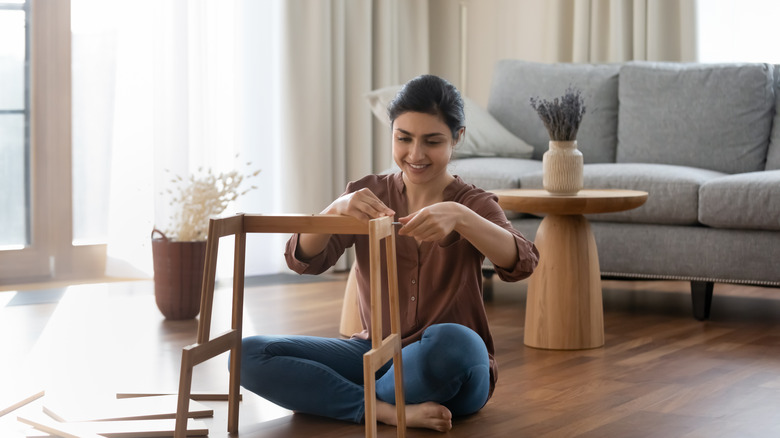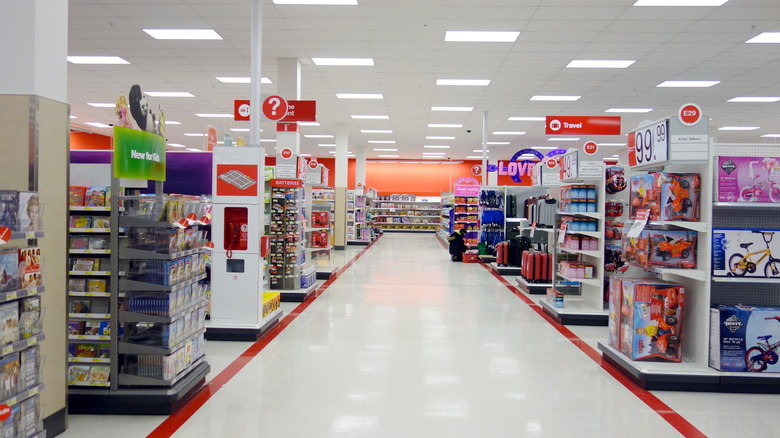The Pros And Cons Of Buying Home Decor At Target
We may receive a commission on purchases made from links.
Target is the place to go for just about anything — groceries, beauty items, and an extensive selection of home décor. From HGTV star Joanna Gaines' Hearth & Hand line to the bold and eclectic items available from Opalhouse, the national retailer sells a vast array of items fit for any style. With nearly 2,000 stores across the United States, it's also one of the more accessible options and provides a trendy collection of items in locales that may not have other big-box stores nearby (via Statista).
Many customers, however, wonder if the items are really worth it. Can this big-box store actually carry reasonably-priced décor that's made to last, or is that a job best left to other businesses? We decided to compile the pros and cons of buying such items at Target to help you make a more educated decision the next time you wander the maze of aisles.
Pro: Accessibility
Because it's one of the more popular retail chains across the country, one of the main benefits of buying home décor there is convenience. In fact, 75% of the country has access to at least one Target store within 10 miles, and the ability to pick up groceries — and countless other items you didn't necessarily intend to buy — at the same location makes it an easy choice for a lot of buyers (via Fortune).
In more rural areas that have fewer retail options, "Tarjay" may be the best bet to find something trendy to freshen up your home's aesthetics. The retailer constantly cycles out old items in favor of what's popular at the moment, a luxury that local mom-and-pop stores may not be able to provide. When you either have the option to drive an hour to the nearest mall or stop by the décor section on your next grocery trip, Target obviously takes the cake on ease and comfort.
Con: Low quality
Looking for a new piece of furniture? Then Target may not be the best option. Most furniture sold there, at Walmart, or other similar big-box stores is likely made of low-quality materials and not built to last. These pieces can do the job as a temporary fix or a low-cost way to furnish a first apartment, but they likely won't survive a major move or a couple of years of wear and tear. This Room Essentials futon is the perfect example. Reviewers say the seats caved in and the arms completely fell off after only a few weeks of use.
If you're still dead set on buying furniture from Target, take some time to assess the quality. Most fast furniture is made from particle board or thin plywood and assembled with staples or small screws. Another tell is the weight — If an item is lighter than you would expect, it's likely made of a lower-quality material and might warp over time, warns Art Sample Home.
Pro: Wide selection
If you've been in a Target store lately, you know the retailer carries a massive selection of products. The same is true for its home décor section. With 45 private labels each featuring a unique aesthetic and product offerings, the choices aren't limited to one specific style (via Target). Hearth & Hand, Threshold, Opalhouse, and Room Essentials are just some of the options available on shelves, and each serves a specific niche of the market.
Of course, while you may come across the issue of not finding what you were looking for in-store, it also has quite an extensive online inventory, with more than 99,000 home décor
items alone. Some may not be convenient to have on shelves, like dining tables and couches, as well as a variety of items that aren't available in every region. Regardless, Target is determined to carry items that appeal to every customer, from Threshold's subtly luxurious bedspreads to Jungalow's bold decorative pieces.
Con: Mass production
Mass production is a great way to lower the overall cost of commodities, but if you're environmentally conscious, it's something important to consider. While people often think about the impact of fast fashion on the environment, the overproduction of furniture and home décor is a major issue as well. Buying cheaply made goods only to replace them when the next hot trend comes along is much less sustainable than investing in a high-quality product that will last a lifetime (via Sugar House Furniture).
Another downside to mass production is that most products aren't unique. If you're truly dedicated to your home's aesthetic, you may be on the hunt for one-of-a-kind pieces that bring a unique flair to any space. Items at Target are designed to be marketable and appeal to a wide audience, so the chances of finding something with a major wow factor are fairly low. While Target is worthwhile for picking up the essentials, look to local businesses and independent artists instead to find something that nobody else carries.
Pro: Affordability
The beneficial side to mass production, of course, is low prices. Target frequently has sales and offers good deals on its home décor products, so picking up an item or two to spruce up your space won't cost you an arm and a leg. Some of its brands, like Threshold, are a bit more expensive and comparable to the prices at a slightly higher-end store. However, the Room Essentials line is designed specifically as a low-cost option (via Target).
Indeed, Room Essentials is great if you're looking to furnish a dorm room or first apartment on a budget. The items are fairly basic across the board — plain colors, simple patterns, unembellished lines — but they do the job in a pinch. A good example is this simple LED table lamp that comes in a variety of colors for only $8. The quality isn't as high as other options, but reviewers are satisfied with its performance — and many recommend it as a simple choice for a dorm room. Pretty much everyone needs a low-cost option at some point, and Target is a good place to serve that purpose.
Con: Unavailable in-store items
If you're planning to purchase a larger item from Target, the chances of finding it in-store are sometimes slim to none. Instead, you'll need to order it online. While many people don't have a problem with this, it can become an issue if you prefer to check an item's quality or see its true size before making a final decision. Luckily, the retailer has a 90-day return window, but shipping back or transporting a dining table that didn't fit in your apartment is still quite the hassle, notes Target.
Overall, Target is a good option for low-priced, easy-to-pick-up décor, but it won't always be the best quality or most unique product on the market. In fact, you're better off looking to other retail stores when trying to find something that will last for years. Still, target carries a great selection of small seasonal items or starter pieces for a first apartment.






